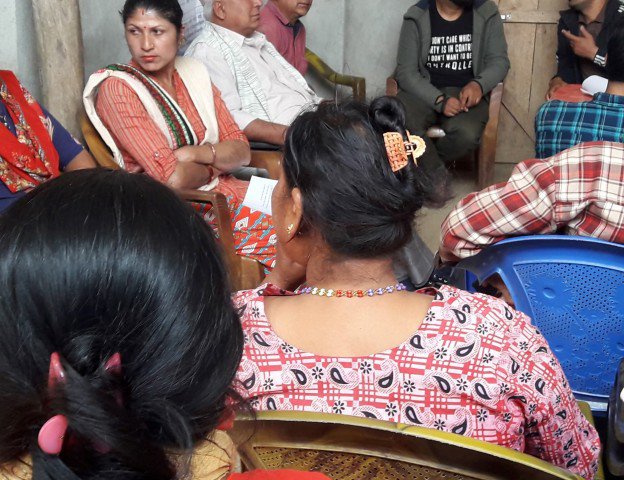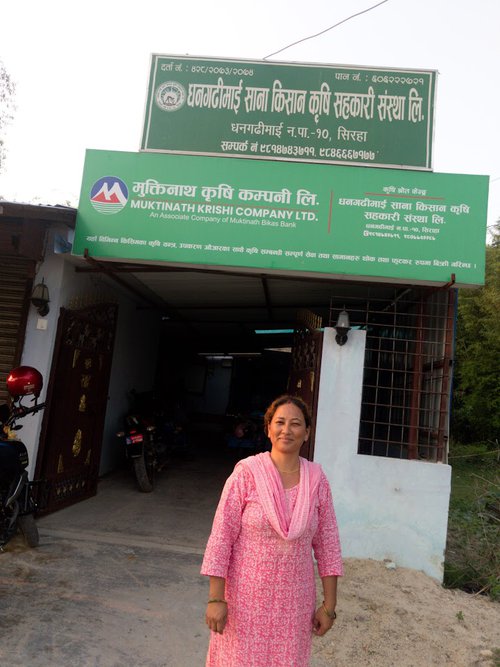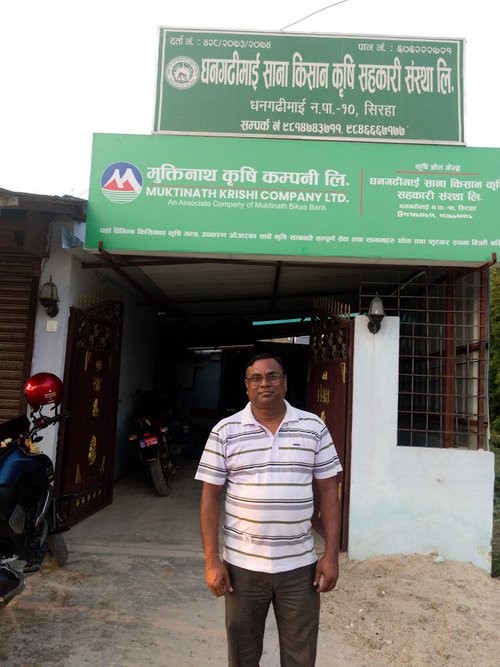
In its 10-year history, Dhangadhimai Sana Kisan Krishi Sahakari Sanstha Ltd has witnessed a dramatic increase in membership and visits from women seeking loans and financial advice, particularly in the last three years. Established a decade ago by a group of 25 women, the cooperative had limited financial packages, capital, and capacity, with just 612 members when it joined the RERP’s Financial Education and Entrepreneurial Knowledge (FEEK) programs in 2021.
Through various structural interventions—including training to strengthen institutional capacity, computerization support to improve transactions, the introduction of new financial packages, and financial literacy programs under FEEK—the cooperative has seen its membership double in just three years. The number of individuals seeking small loans for agriculture, livestock, and off-farm activities like furniture stores has increased significantly. Additionally, savings deposits have grown, and loan recovery rates have improved.

Meena Lama
With more inclusive policies, the cooperative now boasts 1,130 members, including women from poor and marginalized communities, returnee migrants, and migrant families. As membership has increased, the cooperative’s paid-up capital has also risen from Rs. 15 million to Rs. 100 million. Financial literacy efforts have encouraged more members to borrow for small enterprises and deposit savings, especially among migrant families. Despite some initial bad loans, the cooperative now has a running capital of Rs. 35 million.
"This is like a miracle for us. After joining Samriddhi and receiving training under FEEK-1 and FEEK-2, the cooperative organized many programs targeting poor women, migrant families, and returnee migrants. I learned about topics such as money and life, sources of income, income balance, savings, loans, remittances, credit, risks, and micro and small enterprises," said Raman Vikram Shah, manager of the cooperative.
"We have already conducted over 20 financial literacy programs, sharing information about access to finance and financial inclusion with both members and non-members," said Shah, manager of the cooperative. "I provided information on the benefits of engaging with formal financial institutions like cooperatives, including taking loans, sending remittances, saving, and developing business models."
Since all the members of the cooperative are women from marginalized and poor communities, Dhangadhimai Sana Kisan Krishi Sahakari Sanstha Ltd's activities are focused on supporting them, as well as the families of migrant workers and returnee migrants.
"The FEEK program launched by the project has drastically improved access to finance through mainstream financial institutions, microfinance, and other specialized institutions in our project areas. This has expanded opportunities for poorer households, women, migrant families, and returnee migrants to engage in productive activities and enhance their capabilities," said Saroj Prasad Guragain, project manager of Samriddhi.
Samriddhi has found that financial literacy is an essential and unchallengeable condition for the development of inclusive economic growth and access to finance. Besides training, Samriddhi also provided matching funds for concessional loans to poor and marginalized women.
The Sanstha received these funds and distributed them across various supply chains, including vegetable farming and goat rearing.
After signing an MoU with SKBBL, the cooperative's capacity also improved. Over the last three years, FEEK-1 and FEEK-2 classes have significantly accelerated progress for the group.
"Under the financial literacy programs, 88,000 people benefited through 550 trainers, cooperatives, and MFIs during the project period. Of these beneficiaries, 31 percent are from migrant families," said Jiban Shrestha, RERP/Samriddhi Project’s Migration Coordinator.
Dhangadhimai Sana Kisan has introduced new financial packages, providing an additional 20% support in its investment plan to encourage family members of migrant workers and returnee migrants to join. Under this scheme, borrowers can receive a total subsidy of 50%, with 30% of the investment coming from Samriddhi.
As the number of vegetable growers increased, a collective center was established in the market, selling 30 quintals of tomatoes and other vegetables per day.
"We took numerous training sessions under FEEK-1 and FEEK-2, and our cooperative also organized 60 financial literacy classes in our working areas, including wards 9, 10, 11, 12, 13, and 14 of Dhangadhimai Municipality," said Shah.
Over 700 individuals in these areas benefited from financial literacy programs, learning how to use financial products and services from cooperatives and other financial institutions. "Awareness generated through these programs helps prevent major crises in loan recovery. Our financial literacy programs enhanced people's knowledge of saving, credit, loan management, business planning, payments, and more," Shah explained.
With 40% of the families of cooperative members involved in foreign migration and over 20% being returnees, the cooperative is also investing in returnee migrants and aspiring migrants.
Dhangadhimai Sana Krishi provides loans for new startups both on-farm and off-farm, loans to families of migrant workers, and to poor and marginalized women at interest rates ranging from 8% to 12%. Specifically, the cooperative offers agricultural loans at an 8% interest rate per annum, 9% for migrant returnees, and 12% for aspiring migrants. Additionally, it provides an 8% interest rate for short-term savings.
"There is a high risk in providing loans to migrants. Therefore, we cap loans at Rs. 300,000 with a 13% interest rate per annum," said Shah. During financial literacy programs, the cooperative also encourages the formation of new women’s groups. To diversify its functions, Dhangadhimai Sana Kisan Sahakari has started producing wheat flour, rice, and lentils.
With 40% of its 1,130 members working abroad, the Sanstha mobilizes their savings and lends substantial amounts to them. Sumitra Lama, a board director of the cooperative, shared her challenges in loan recovery from migrant families.
"Some women have abandoned their traditional agricultural work and rely entirely on their husbands' remittances. This dependency has led to about five percent of our women failing to repay loans taken to send their husbands abroad," Lama explained. "We provide counseling to these women. After attending financial literacy courses and counseling, some have returned to agriculture and resumed their loan payments."
In the past three years, the cooperative has provided loans to 60 individuals for air tickets and visas. "Of these, ten percent returned home without working long. We provided additional loans to help them start careers back home and repay their initial loans. Two have started furniture businesses, three are engaged in vegetable farming, and two are raising goats," said Tamang. "They are repaying their loans."
These efforts highlight the impact of promoting financial literacy and providing access to financial products and services in rural areas.
The cooperative also received support under the Technology Access Program, receiving a laptop and printer for its daily transactions and activities.
The primary objective of the program was to introduce and promote modern technology within these cooperatives, aiming to enhance transparency and expedite service delivery. Under this scheme, the cooperative has been providing remittance-based financial products and has initiated remittance services.
"We gained a deeper comprehension of market dynamics, financial management, and operational strategies, enhancing our overall readiness to face the challenges of the business world," said Shah.
FEEK focused on empowering the community through cooperatives by enhancing their financial literacy, financial management, and business skills at the household level, making the choice of cooperatives highly effective. As the project comes to a close, FEEK has been instrumental in equipping the community with the essential knowledge and skills needed for financial stability and success.
After receiving training, Shah is now a FEEK facilitator, playing a pivotal role in delivering financial literacy and business skills training in their communities. His reach extends to both cooperative members and non-members, ensuring that a broader spectrum of the population benefits from this valuable education.
"The credit for all these changes goes to the Samriddhi project's financial education and professional knowledge training. After collaborating with the project, our cooperative had the opportunity to participate in a three-day financial education and business knowledge training," said Lama. "We learned that a cooperative can be successful by expanding its membership."
As most of the men are abroad, some spouses started to misuse the money. "We are now visiting house-to-house to convince the women about the future. In some cases, women took loans from seven banks and cooperatives using fraudulent documents. We have learned a lot from the recent crisis and are now implementing many safeguards to avoid bad loans. We need to invest in productive sectors," Lama added.

Shaha: Manager
"We are no longer investing in foreign workers randomly as we did in the past. Now, we focus on agriculture, livestock, and goat rearing, where the returns are higher," said a representative from Dhangadhimai Sana Kisan Sahakari.
Remittances are critical in Nepal, estimated at US$11 billion in 2023, accounting for 26.6 percent of the country’s GDP. The residents of Dhangadhimai Municipality heavily rely on remittances for their livelihood, and cooperative loans and recovery are also dependent on migrant workers and remittances.
"Remittance senders or receivers are usually women. This is an opportunity to include them financially by designing specific financial products and training that enhance women's financial inclusion and economic empowerment," said Bibiana Vàsquez, Senior Remittances, Diaspora, and Inclusive Finance Specialist at IFAD, during the observance event for the International Day of Family Remittances on June 10 in Kathmandu.
Roshan Cooke, IFAD Country Director for Nepal and Bhutan, noted that "in Nepal, it is estimated that remittances make up about 80 percent of smallholder farm households’ income, while only 20 percent of income is earned from agriculture itself." He stated this during the June 10 program, emphasizing that the project has benefited rural households, migrants, and remittance receivers through financial inclusion and enterprise development.
With a total population of 47,449, over half of Dhangadhimai Municipality's residents are migrant workers. "Our people are heavily dependent on remittances. Supported by cooperatives, we are introducing several schemes to attract women and youth to agriculture, livestock, and dairy. We had intensive discussions with the Samriddhi Project last year, which also supported some concessional schemes here. Engaging families of migrants in agriculture and investing remittances sent by migrant workers is key to our prosperity," said Mayor Shiva Shanker Mahato. "We need projects like Samriddhi focusing on these groups."
“Financial inclusion is essential not only to provide access to financial services for those at the bottom of the income scale and vulnerable populations but also to empower them economically by preventing dependence on exploitative informal finance,” said Indira Shrestha, Financial Inclusion Officer of RERP.
Samriddhi has demonstrated that an inclusive financial system ensures the availability of basic financial services—such as savings, credit, payment, and insurance—to all people, regardless of income or location, at a reasonable cost.
As the World Bank asserts, access to financial services plays a critical role in reducing extreme poverty, boosting shared prosperity, and supporting inclusive and sustainable development. Samriddhi's efforts in creating an inclusive financial system are vital for achieving several Sustainable Development Goals (SDGs).
"Ensuring financial inclusion is crucial for making the financial system inclusive, reducing poverty and inequality, and achieving SDG goals. Observing the voices of beneficiaries at the program, Samriddhi Project's financial inclusion initiatives have provided valuable lessons. Nepal Rastra Bank has been encouraging enhanced financial inclusion and the availability of financial services to those deprived of these services at an affordable cost and proximity," said Dr. Prakash Kumar Shrestha, Director of the Economic Research Department at Nepal Rastra Bank.
As the project comes to an end, significant changes in access to finance and financial inclusion can be observed, particularly for poor and marginalized women, returnee migrants, and migrant families in the project's areas across three provinces, 16 districts, and 208 Palikas.
"Samriddhi’s key learning is that access to finance is crucial for the financial inclusion of all people, including women and returnee migrants living in rural parts of the country," said Sanjeev Kumar Shrestha, National Consultant (Value Chain & Markets) at International Fund for Agricultural Development (IFAD).
With the support of Samriddhi, the Small Farmer's Agricultural Cooperative, based in Ward 10 of Dhangadhi Mai Municipality in Dhangadhi Bazar, Siraha District of Madhesh Province, 400 kilometers east of Kathmandu, has celebrated a decade of success. The cooperative has formed ten sub-groups and significantly increased its membership.

Keshab Poudel
Poudel is the editor of New Spotlight Magazine.
- ETFC Nepal is focused on expanding distribution and transmission to the private sector: ETFC Chair Dr. Dhital
- Jul 05, 2025
- FOURTH PROFESSOR Y.N. KHANAL LECTURE: Nepal-China Relations
- Jun 23, 2025
- Colonel JP CROSS: Centenary Birthday
- Jun 23, 2025
- REEEP-GREEN: Empowering Communities with MEP
- Jun 16, 2025
- BEEN: Retrofitted For Green
- May 28, 2025















